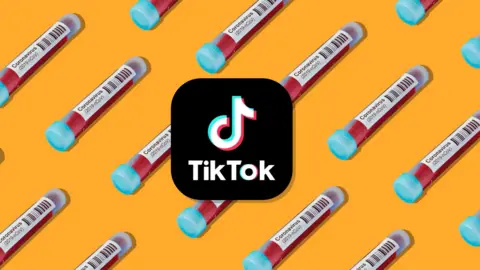Coronavirus: TikTok deletes 29,000 rule-breaking videos
 BBC/Getty Images
BBC/Getty ImagesTikTok says it has deleted about 29,000 coronavirus-related videos that broke its rules in Europe alone since the beginning of 2020.
The video-sharing app says it does not allow misinformation that could harm an individual's health or public safety.
It said about 3,000 of them contained medical misinformation and described the numbers as "low-level".
The number of coronavirus-themed videos breaking the rules has fallen every month, since a peak in March, it said.
On 9 July, the business published its latest transparency report, in which it said 49 million videos had been removed between July and December 2019.
About a quarter of those were deleted for containing adult nudity or sexual activity.
The business said it was "difficult to measure with absolute certainty" how many of this year's videos contained coronavirus misinformation.
But it said it had added a coronavirus information banner to posts containing words, hashtags or music relating to Covid-19.
It described the numbers as "low-level".
TikTok said it had applied the banner to seven million videos in Europe since the beginning of 2020 - 700,000 of those by UK creators.
It added that its coronavirus information page had been viewed more than 52 million times across the UK, Germany, France, Italy, and Spain.

Analysis
by Marianna Spring, specialist disinformation and social media reporter
While these numbers show some action from TikTok in fighting misinformation, it has become increasingly clear during the pandemic that conspiracy theories - coronavirus or otherwise - still thrive on the platform.
That includes everything from videos promoting false claims linking 5G to the virus, to the latest baseless conspiracy theory suggesting furniture firm Wayfair is involved in a child-trafficking operation. These can cause harm, too.
Some of this content has been removed, but conspiracies of all varieties grip the app's younger audience.
TikTok's policy prohibiting misinformation that causes harm to the general public is a high bar to meet.
And the platform's infamously mysterious algorithms and search tools make it all the more difficult for users, journalists and reporters to find and flag what is being shared.
The US election in November is expected to be a key place for online conversation - and TikTok will be under increasing pressure to tackle disinformation on its platform.
